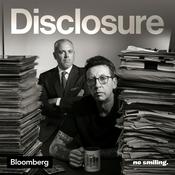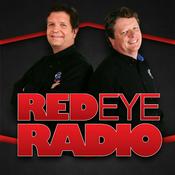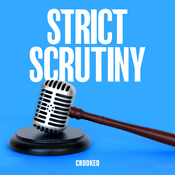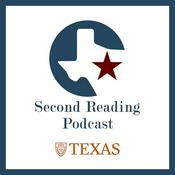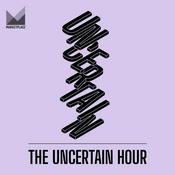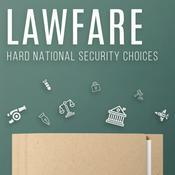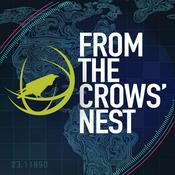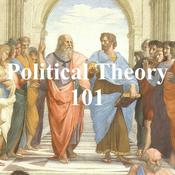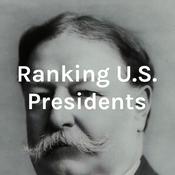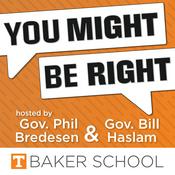244 episodes
- The Cognitive Crucible is a forum that presents different perspectives and emerging thought leadership related to the information environment. The opinions expressed by guests are their own, and do not necessarily reflect the views of or endorsement by the Information Professionals Association.
During this episode, Andrew Whiskeyman discusses his co-authored article: The Emergence of Cognitive Intelligence (COGINT) as a New Military Intelligence Collection Discipline. "COGINT" is the systematic mapping, safeguarding, and operational exploitation of decision-making architectures in the contemporary cognitive battle space. Topics include: understanding and protecting human decision-making processes from adversarial tactics, adversarial exploitation of technology and societal divisions to manipulate public opinion, and underscoring the vital need for critical thinking.
Recording Date: 22 January 2026
Research Question: Andrew Whiskeyman suggests an interested student or researcher examine:
When is a conspiracy theory no longer a theory?
How does one build a culture of civil discourse and disagreement?
Of mobs and men: how does individual behavior and decision relate to group dynamics?
AI and human trust/decision dynamics.
Resources:
Cognitive Crucible Podcast Episodes Mentioned #62 Jonathan Rauch on the Constitution of Knowledge
#119 Katherine Carman on Truth Decay
#153 Andy Whiskeyman and Mike Berger on the Importance of Dedicated Resources
The Emergence of Cognitive Intelligence (COGINT) as a New Military Intelligence Collection Discipline by Jorge Conde and Andy Whiskeyman
S. Rept. 119-39 - National Defense Authorization Act (NDAA) for Fiscal Year 2026 dated 15 July 2025
Salt Typhoon
The Everlasting Man: A Guide to G.K. Chesterton's Masterpiece by Dale Ahlquist
Aristotle's Rhetoric
The Structure of Scientific Revolutions by Thomas Kuhn
Warhead: How the brain shapes war and war shapes the brain by Nicholas Wright
Link to full show notes and resources
Guest Bio:
Dr. Andrew Whiskeyman, COL (ret.), is the co-founder and CEO of JASSA Professional Services, which provides consulting and subject matter expertise on strategy, technology, predictive analysis, and people. He also teaches, writes, researches, and lectures internationally on the topics of information warfare, cognitive security, emerging technology, and strategic foresight.
He is a Goodpaster Scholar, a non-resident senior fellow with the Global National Security Institute (GNSI) and former board member of the Information Professionals Association (IPA). Dr. Whiskeyman adjuncts with Catholic Polytechnic University, Syracuse University's Maxwell School of Citizenship and Public Affairs, and the US Air Force's Air War College.
He is a former Chair of the Cyber Strategy Department at the National Defense University's College of Information and Cyberspace (CIC) where he taught and researched on the nexus of information and national security. He previously served for 28 years in the US Army and deployed multiple times in support of combat operations.
His final military assignment was as the Chief of the Information Operations Division (J39) within the U.S. Central Command (CENTCOM) Operations Directorate J3 located at Macdill AFB, Florida. His previous assignment was as the Chief of Strategy for the CENTCOM Joint Cyber Center (JCC). His first assignment was to Misawa AB, Japan as an enlisted military intelligence Soldier. He then went to officer candidate school (OCS) and commissioned into the basic branch of Air Defense Artillery. In 2007, he transitioned to the Information Operations functional area (FA30).
He has deployed five times: Kosovo (KFOR 3B - 2001/02), Afghanistan (3 times - 2004, 2006/07, and 2012/13), and Iraq (2008/09). He also has numerous shorter trips into the Middle East theater of operations including return trips to Iraq and Afghanistan.
He is a graduate (and plank owner) of the Marine Corps Expeditionary Warfare School (EWS - 2004), Air Command and Staff College (ACSC 2011 in residence), and the School of Advanced Air and Space Studies (SAASS XXI - 2012). He is the first Soldier with the Advanced Strategic Planning and Policy Program (ASP3) to earn his PhD (Military Strategy, Air University 2015). He is the recipient of multiple military awards including the Defense Superior Service Medal and the Bronze Star, and he was awarded France's Chevalier de L'Ordre du National Mérite.
He is also active in the Tampa Bay community. He is the founder of the local Tampa Bay GK Chesterton Society, leads an Exodus 90 fraternity, served as a past Grand Knight for the Servant of God Vincent Capodanno Council 14495 (Knights of Columbus), created and teaches two Apologetics Courses for Homeschool students, and is a mentor with the Tepeyac Leadership Institute.
He is married (over 30 years) with four children, two grandchildren, two dogs, and a turtle.
About: The Information Professionals Association (IPA) is a non-profit organization dedicated to exploring the role of information activities, such as influence and cognitive security, within the national security sector and helping to bridge the divide between operations and research. Its goal is to increase interdisciplinary collaboration between scholars and practitioners and policymakers with an interest in this domain.
For more information, please contact us at [email protected].
Or, connect directly with The Cognitive Crucible podcast host, John Bicknell, on LinkedIn.
Disclosure: As an Amazon Associate, 1) IPA earns from qualifying purchases, 2) IPA gets commissions for purchases made through links in this post. - The Cognitive Crucible is a forum that presents different perspectives and emerging thought leadership related to the information environment. The opinions expressed by guests are their own, and do not necessarily reflect the views of or endorsement by the Information Professionals Association.
During this episode, Anthony Vinci, author of The Fourth Intelligence Revolution, discusses how the battlefield has shifted from physical territory to the human brain. From China's influence within U.S. education and gaming to the subtle "mind hacking" potential of AI-generated misinformation, Anthony breaks down the strategic landscape of modern information operations. Join us for a deep dive into the risks posed by TikTok, the crisis of masculinity in the digital age, and how we can build individual resilience against an era of total surveillance.
Recording Date: 8 Jan 2026
Resources:
Cognitive Crucible Podcast Episodes Mentioned #100 Rand Waltzman on the Metaverse and Immersive Virtual Reality
#212 Libby Lange on Algorithmic Cognitive Warfare
The Fourth Intelligence Revolution: The Future of Espionage and the Battle to Save America by Anthony Vinci
The Age of Surveillance Capitalism: The Fight for a Human Future at the New Frontier of Power by Shoshana Zuboff
Princeton Review
Link to full show notes and resources
Guest Bio: Anthony Vinci is the author of The Fourth Intelligence Revolution: The Future of Espionage and the Battle to Save America (Henry Holt, 2025). He served as the first Chief Technology Officer at the National Geospatial-Intelligence Agency (NGA) where he was one of the first leaders to bring AI into intelligence. Earlier in his career he served in Iraq, Africa, and Asia. After leaving the world of intelligence, Vinci became an executive at a private equity firm and CEO of VICO, an AI company that is bringing the intelligence revolution to the rest of us by democratizing intelligence analysis. He is an Adjunct Senior Fellow at the Center for a New American Security (CNAS) and received his PhD in International Relations from the London School of Economics.
About: The Information Professionals Association (IPA) is a non-profit organization dedicated to exploring the role of information activities, such as influence and cognitive security, within the national security sector and helping to bridge the divide between operations and research. Its goal is to increase interdisciplinary collaboration between scholars and practitioners and policymakers with an interest in this domain.
For more information, please contact us at [email protected].
Or, connect directly with The Cognitive Crucible podcast host, John Bicknell, on LinkedIn.
Disclosure: As an Amazon Associate, 1) IPA earns from qualifying purchases, 2) IPA gets commissions for purchases made through links in this post. - The Cognitive Crucible is a forum that presents different perspectives and emerging thought leadership related to the information environment. The opinions expressed by guests are their own, and do not necessarily reflect the views of or endorsement by the Information Professionals Association.
John Boyd is well known to have formally written down very little of his own theories on war and conflict, making researching his concepts challenging and leading many to infer meanings based on their own interpretations—or others'—of what little easily accessible evidence of his thinking remains. In Snowmobiles and Grand Ideals, Ian Brown unpacks Boyd in his own words delivered during his lectures.
Recording Date: 9 Dec 2025
Resources:
Cognitive Crucible Podcast Episodes Mentioned #146 Sebastian Bae on Gaming
Snowmobiles and Grand Ideals: John Boyd's Vision for Thriving in Chaos by Ian T. Brown and Frans P. B. Osinga
A New Conception of War by Ian T. Brown
YouTube: Steve Jobs Introducing The iPhone At MacWorld 2007
Destruction and Creation by John Boyd (1976)
Link to full show notes and resources
Guest Bio: Ian Brown is a retired Marine Corps CH-53E Super Stallion helicopter pilot with multiple deployments to Iraq, Afghanistan, and the Pacific region. He has written dozens of articles, reviews, and short stories for a variety of defense-related publications, covering topics of military history, military theory, future war, and wargaming. His book A New Conception of War: John Boyd, the U.S. Marines, and Maneuver Warfare (Marine Corps University Press, 2018) was added to the Commandant of the Marine Corps' Professional Reading Program in 2019. He currently works as a wargame analyst for Group W and has designed several wargames independently.
About: The Information Professionals Association (IPA) is a non-profit organization dedicated to exploring the role of information activities, such as influence and cognitive security, within the national security sector and helping to bridge the divide between operations and research. Its goal is to increase interdisciplinary collaboration between scholars and practitioners and policymakers with an interest in this domain.
For more information, please contact us at [email protected].
Or, connect directly with The Cognitive Crucible podcast host, John Bicknell, on LinkedIn.
Disclosure: As an Amazon Associate, 1) IPA earns from qualifying purchases, 2) IPA gets commissions for purchases made through links in this post. - The Cognitive Crucible is a forum that presents different perspectives and emerging thought leadership related to the information environment. The opinions expressed by guests are their own, and do not necessarily reflect the views of or endorsement by the Information Professionals Association.
During this episode, Bill Wall discusses Accrete AI's comprehensive AI platform. The conversation explores the necessity for the U.S. to balance military focus with information strategies, diplomacy, and a deeper understanding of the populace to achieve success in modern conflicts.
Recording Date: 9 Dec 2025
Resources:
Cognitive Crucible Podcast Episodes Mentioned #56 Bob Jones on Governance
Accrete AI
Seven Pillars of Wisdom: A Triumph by T.E. Lawrence
The Tipping Point: How Little Things Can Make a Big Difference by Malcolm Gladwell
LikeWar: The Weaponization of Social Media by P. W. Singer and Emerson T. Brooking
Contagious: Why Things Catch On by Jonah Berger
Link to full show notes and resources
Guest Bio:
Bill Wall is the CEO and Co-Founder of Accrete AI Government, an enterprise AI company helping government entities rapidly capture and analyze massive amounts of siloed data, providing analysts with deep insights that enable faster decision-making.
Bill has a unique background, combining elite military service and deep experience in the sales and implementation of innovative solutions that drive business transformation. In the private sector, Bill has built technology teams across various industries. His professional experience includes leadership roles at companies like EMC, Praescient Analytics, Boundless Geospatial, and Flywheel Data, where he focused on IT solutions, big data analytics, and geospatial software.
Before entering the corporate world, Bill retired from the Army as a Special Forces Lieutenant Colonel after twenty-two years in service. During his military career, he founded a computer network operations organization within the Joint Special Operations Command (JSOC) and deployed multiple times to Afghanistan, Iraq, and Yemen where he worked closely with the national intelligence community to transform the way intelligence was developed and shared.
Academically trained in international relations, Bill holds a Bachelor of Science from Georgetown University's School of Foreign Service and a Master of Arts in International Relations and Latin American Studies from the University of Miami. Beyond his professional achievements, he has been married to Francesca for 30 years and is a father to two sons, sharing his home with two dogs and a cat.
About: The Information Professionals Association (IPA) is a non-profit organization dedicated to exploring the role of information activities, such as influence and cognitive security, within the national security sector and helping to bridge the divide between operations and research. Its goal is to increase interdisciplinary collaboration between scholars and practitioners and policymakers with an interest in this domain.
For more information, please contact us at [email protected].
Or, connect directly with The Cognitive Crucible podcast host, John Bicknell, on LinkedIn.
Disclosure: As an Amazon Associate, 1) IPA earns from qualifying purchases, 2) IPA gets commissions for purchases made through links in this post. #237 Josh "Bugsy" Segal on Ukraine, Electronic Warfare, and Fast Battlefield Innovation
12/23/2025 | 51 mins.The Cognitive Crucible is a forum that presents different perspectives and emerging thought leadership related to the information environment. The opinions expressed by guests are their own, and do not necessarily reflect the views of or endorsement by the Information Professionals Association.
During this episode, Dr. Josh "Bugsy" Segal recaps his recent observations from the Ukraine battlefield and concerns for Western governments which don't adapt quickly. Ukraine's rapid development of sophisticated, cost-effective domestic defense technology, including advanced counter-drone systems, is positioning the nation as a key arms supplier of the future. This innovation highlights a critical national security concern for the U.S., as expensive Western weapons have proven ineffective against Russian countermeasures, and the American defense industry is failing to incorporate vital battlefield insights. To maintain its global defense sector dominance, the U.S. must accept its current competitive disadvantage and immediately prioritize collaboration with Ukraine to integrate its effective, relevant technology.
Recording Date: 12 Dec 2025
Resources:
Cognitive Crucible Podcast Episodes Mentioned #192 Josh "Bugsy" Segal on the American Maginot Line
#219 Dr. Josh Segal on Are We Losing the War? Lethality, Deterrence, and Information
Ukraine offers a roadmap for faster and cheaper battlefield innovation by Josh Segal
Defense in depth
Brave 1 Ukrainian Defense Innovation
Fire Point Weapons Systems
Link to full show notes and resources
Guest Bio:
Josh Segal holds a Ph.D. in Russian Studies from George Washington University and an MA in Russian Studies from Emory University and graduated Summa Cum Laude from Emory. He is a former negotiator on Chemical Weapons Convention and helped establish the OPCW, and other treaties in the 1990s, became active duty Navy Info warfare and intel officer and served 27 years, finishing as Director of the Information Warfare Program and finally at US Special Operations Command.
Current;y, he is a senior advisor to a number of Department of War leaders across Policy and the Services, recently returned from 11 speaking engagements in Europe and North America on Hybrid Warfare.
About: The Information Professionals Association (IPA) is a non-profit organization dedicated to exploring the role of information activities, such as influence and cognitive security, within the national security sector and helping to bridge the divide between operations and research. Its goal is to increase interdisciplinary collaboration between scholars and practitioners and policymakers with an interest in this domain.
For more information, please contact us at [email protected].
Or, connect directly with The Cognitive Crucible podcast host, John Bicknell, on LinkedIn.
Disclosure: As an Amazon Associate, 1) IPA earns from qualifying purchases, 2) IPA gets commissions for purchases made through links in this post.
More Government podcasts
Trending Government podcasts
About The Cognitive Crucible
The Cognitive Crucible explores all aspects of our generational challenge: Cognitive Security. It is the only podcast dedicated to increasing interdisciplinary collaboration between information operations practitioners, scholars, and policy makers. Join the discussion forum each week with the Cognitive Crucible host, John Bicknell. Have a question or would like to suggest a topic go to: https://information-professionals.org/podcasts/cognitive-crucible.
Podcast websiteListen to The Cognitive Crucible, Disclosure and many other podcasts from around the world with the radio.net app
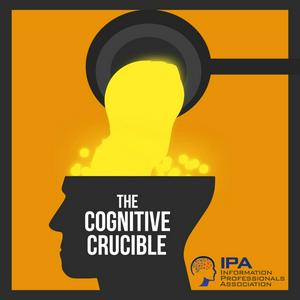
Get the free radio.net app
- Stations and podcasts to bookmark
- Stream via Wi-Fi or Bluetooth
- Supports Carplay & Android Auto
- Many other app features
Get the free radio.net app
- Stations and podcasts to bookmark
- Stream via Wi-Fi or Bluetooth
- Supports Carplay & Android Auto
- Many other app features


The Cognitive Crucible
Scan code,
download the app,
start listening.
download the app,
start listening.

